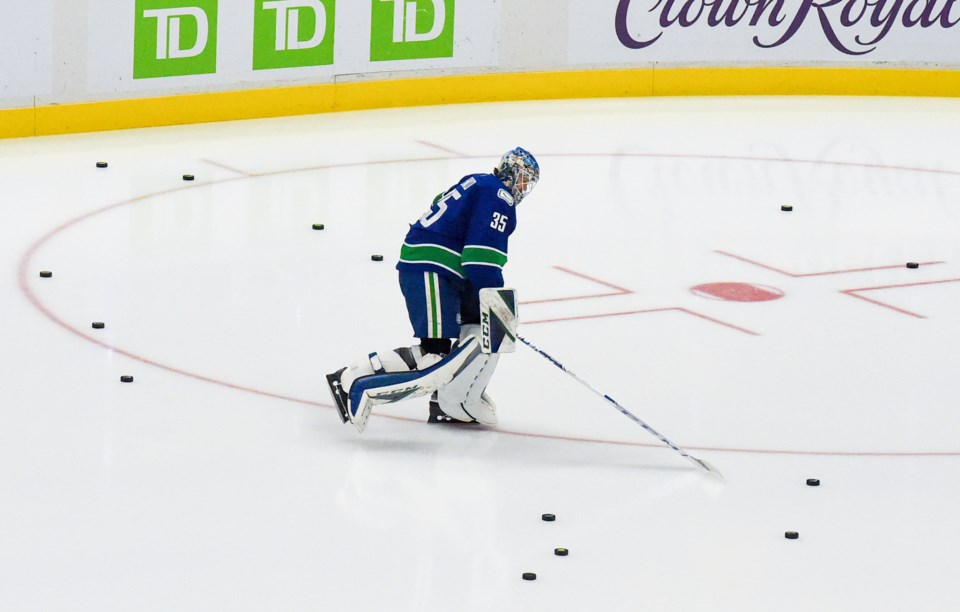Two trades with the Florida Panthers bookended the Vancouver Canucks’ goalie graveyard era.
That era lasted eight years but it felt much longer. It began with the trade of Kirk McLean to the Panthers in 1998 and ended with the acquisition of Roberto Luongo in 2006. Between those two clear number-one goaltenders, the Canucks saw a slew of talented goaltenders crash and burn or mediocre goaltenders elevated above their station — names like Arturs Irbe, Felix Potvin, Garth Snow, Alex Auld, Sean Burke, and, of course, Dan Cloutier.
Luongo’s arrival in Vancouver signaled the end of the goalie graveyard. He was one of the best goaltenders in the NHL — arguably the best in his first season with the Canucks despite finishing second in Vezina voting — and gave the Canucks rock-solid goaltending year after year.
In fact, one of the major issues for the Canucks in the years since Luongo arrived has been having too many good goaltenders. Cory Schneider had to battle for starts with Luongo before he was traded, then Luongo was traded as well, replaced by Ryan Miller, then Jacob Markstrom, then the ascension of Thatcher Demko to the number-one role.
"The Canucks haven't said no."
Up until this current season, Canucks fans experienced 15 straight years with at least good, if not great goaltending. It’s been easy to take it for granted but this season has punctured that particular balloon — without top-tier goaltending repeatedly bailing them out, the Canucks’ defensive deficiencies grew impossible to ignore.
That makes the recent rumours that the Canucks are open to trading Thatcher Demko somewhat troubling. Insiders like Sportsnet’s Elliotte Friedman and ChekTV’s Rick Dhaliwal have been reporting over the past week that Demko’s name keeps coming up in trade talks.
Other reports have indicated that the Canucks have just one untouchable player on their roster: Elias Pettersson. Anyone else on the roster can be had for the right price, including Demko.
ESPN’s Emily Kaplan reported that multiple teams have reached out to the Canucks about Demko.
“Per sources, at least four teams have called Vancouver asking about Demko's availability — and the Canucks haven't said no to any of those teams,” said Kaplan. “If Vancouver is serious about a rebuild, it could get a lot of assets for Demko, who is just 27 and under contract for three more years on a team-friendly $5 million per season.”
She did note that a trade is not likely to be imminent, as Demko hasn’t played since December 1 with a lower-body injury. Teams will surely want to see him healthy and thriving before they’ll be willing to pay whatever the Canucks’ asking price is for Demko.
Incidentally, Demko was back on the ice on Tuesday, though he skated separately from the rest of his teammates.
But would the Canucks really move Demko? Should they?
The Canucks have no heir for Demko in the system
While Demko struggled early this season, he’s proven in the previous two seasons that he can be a workhorse number-one goaltender, thriving even in a difficult defensive environment. That’s not something that is easy to find and shouldn’t be taken for granted.
There’s also the question of how much a goaltender can actually get on the trade market. Goaltenders are rarely moved for even a first-round pick, so the idea that Demko would automatically bring back a haul might be mistaken.
The reasons why are fairly simple: there are only 32 starting jobs available in the NHL and every team already has a cadre of goaltenders in their system, so the number of teams that are actually looking to spend assets to acquire a goaltender is limited. That keeps prices down.
More than that, the Canucks have no one in the system who is even close to replacing Demko.
Their two goaltenders currently in the NHL, Spencer Martin and Collin Delia, have looked like the AHL journeymen that they were before joining the Canucks.
21-year-old Arturs Silovs has been capable enough in his first year as the starter for the Abbotsford Canucks in the AHL but he still only has a .901 save percentage, which is ranked 30th in the AHL among the 49 goaltenders with at least 15 games played. He’s a long way from being NHL ready.
19-year-old Aku Koskenvuo struggled at the World Juniors and has played just two games for Harvard University in the NCAA this season.
22-year-old Matthew Thiessen has found his game this season in his fourth year in the NCAA, with a .910 save percentage for the University of Minnesota-Duluth, but he’s still a longshot to even be signed by the Canucks to play in the AHL, let alone play NHL games.
The newest addition to the prospect pool is Ty Young, selected in the fifth round of the 2022 NHL Entry Draft. The 18-year-old goaltender has split starts with New Jersey Devils prospect Tyler Brennan for the Prince George Cougars and neither one has been particularly good. Young’s .892 save percentage is 25th in the WHL among the 43 goaltenders with at least ten games played.
It’s enough to make one wonder if Canucks director of goaltending Ian Clark is a lot better at coaching goaltenders than he is at scouting them.
With no heir apparent in the system, what would the Canucks do in net if they traded Demko? Spend too much money in free agency on someone like Tristan Jarry? Spend assets of their own to trade for a goaltender? Keep riding with AHL-caliber reclamation projects? Hope for the best from one of the prospects?
President of hockey operations Jim Rutherford and general manager Patrik Allvin have dismissed the idea of a full-scale, long-term rebuild but trading Demko would be a clear signal that they are rebuilding.
It might also be the first step in once again becoming a goalie graveyard.




